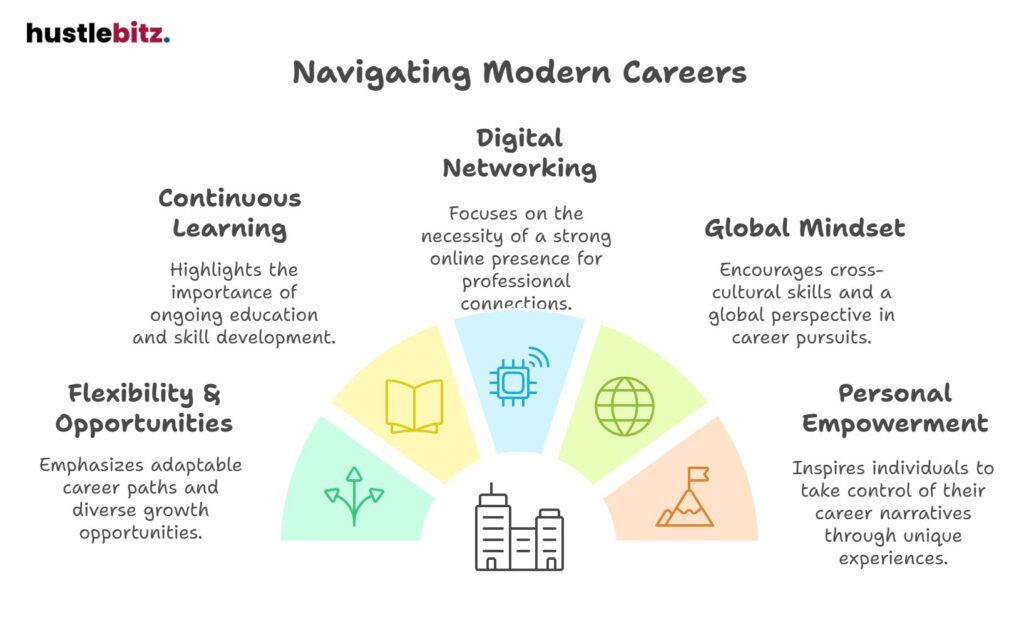The evolution of career advancement strategies marks a transition from traditional, linear paths to more agile, skill-oriented approaches. Technological advancements and globalization have reshaped how professionals navigate their careers. Continuous learning and adaptability now define successful career growth, with an emphasis on skill development and diverse pathways. Digital networking expands opportunities beyond local markets, fostering connections that enhance visibility. Individuals increasingly take charge of their career narratives, crafting personalized journeys aligned with their interests. As the landscape continues to change, understanding these trends can provide valuable insights into effective career strategies.
Key Takeaways
- Career advancement has shifted from linear promotions to dynamic pathways, emphasizing flexibility and diverse opportunities for personal growth.
- Continuous learning and skill development are now vital for career growth, with mentorship and workshops playing crucial roles.
- Digital networking expands professional connections and visibility, making a robust online presence essential for career strategies.
- Globalization necessitates a global mindset and cross-cultural skills, transforming access to international career opportunities.
- Individuals are empowered to take charge of their career paths, crafting unique narratives through varied experiences and lifelong learning.

The Shift in Career Growth Tactics

The landscape of career growth tactics has evolved significantly, driven by technological advancements and changing organizational dynamics. In today’s fast-paced environment, traditional methods of career advancement, such as linear promotions, are becoming increasingly obsolete. Instead, employees are encouraged to embrace a more dynamic approach to career development and advancement. This shift emphasizes the importance of continuous learning, adaptability, and networking as essential strategies for career advancement.
Organizations are now recognizing that their most valuable asset is their workforce. As a result, they are implementing innovative strategies for career advancement that prioritize employee skill development and engagement. This includes opportunities for professional training, mentorship programs, and exposure to cross-functional roles. Such initiatives not only facilitate career growth for employees but also enhance organizational productivity and retention.
Moreover, the rise of digital platforms has transformed how individuals pursue career development and advancement. Professionals can now access a wealth of online resources, webinars, and virtual networking events that empower them to take charge of their career trajectories. This democratization of knowledge allows employees to create personalized strategies for career advancement tailored to their unique aspirations and strengths.
Evolutionary Shifts in Career Advancement Strategies

Recent advancements in technology and shifts in workplace culture are driving evolutionary changes in career advancement strategies, necessitating a more proactive and personalized approach for professionals. Traditional linear career paths are being replaced by more dynamic and flexible models that emphasize continuous career development and adaptability. Professionals are increasingly seeking development opportunities that align with their individual goals and values, resulting in a more tailored career strategy.
In this new landscape, organizations are also adapting by fostering environments that encourage professional growth. Collaborative projects, mentorship programs, and skill development workshops are becoming integral parts of a comprehensive career advancement strategy. The following table illustrates the key shifts observed in career advancement strategies:
| Key Shift | Description |
| From Hierarchical to Agile | Emphasizing flexibility and responsiveness in career paths. |
| Skills Over Titles | Prioritizing skills acquisition over traditional job titles. |
| Networking as a Strategy | Leveraging connections to unlock new development opportunities. |
| Continuous Learning | Fostering a culture of lifelong learning and upskilling. |
These evolutionary shifts in career advancement strategies reflect a growing recognition that success is not solely determined by job titles but rather by the ability to adapt, learn, and grow within an ever-changing professional landscape. As professionals embrace these changes, they are better equipped to navigate their careers and seize new opportunities for advancement.
The Rise of Digital Networking
How has digital networking transformed the landscape of professional connections and career advancement opportunities? In recent years, the rise of digital networking has revolutionized how individuals engage with one another in professional spheres. Platforms such as LinkedIn, Twitter, and various industry-specific forums have made it easier than ever to connect with peers, mentors, and potential employers, thereby creating a dynamic environment where career development is important.
Digital networking enables professionals to expand their networks beyond geographical limitations, opening doors to opportunities for growth that were previously inaccessible. By participating in online discussions and sharing expertise, individuals can showcase their skills, thereby enhancing their professional development. This visibility often leads to increased recognition and, ultimately, greater advancement opportunities.
Moreover, crafting a robust digital presence is a critical component of modern career strategy; it is a vital tool in highlighting one’s achievements and aspirations. Professionals can strategically curate their profiles and content to align with their career goals, attracting the attention of recruiters and industry leaders.
As organizations increasingly rely on digital platforms for recruitment and talent management, the significance of effective digital networking cannot be overstated. It is essential for individuals to leverage these tools to navigate the complexities of the job market, ensuring they remain competitive and well-positioned for future opportunities.
In this evolving landscape, those who master digital networking will undoubtedly find themselves at an advantage in their career advancement journey.
The Modern Evolution of Career Development

Amidst the advancements in digital networking, the landscape of career development has evolved significantly, reflecting the changing dynamics of professional growth and opportunity.
Today’s professionals are increasingly expected to take ownership of their career paths, necessitating the creation of a comprehensive career development plan. This proactive approach enables individuals to identify and pursue opportunities for advancement that align with their skills and aspirations.
Modern strategies for career development emphasize continuous learning and employee development, recognizing that the workforce is constantly evolving. Organizations are investing in training programs and mentorship opportunities that not only enhance employees’ competencies but also foster a culture of personal and professional growth. Such environments encourage individuals to expand their skill sets and explore new roles within the organization, effectively aligning their career trajectories with organizational goals.
Furthermore, technology plays a pivotal role in shaping career development strategies. Online platforms and resources facilitate networking and knowledge sharing, enabling professionals to connect with industry leaders and peers who can offer valuable insights and guidance. This interconnectedness allows for a more dynamic approach to career advancement, where individuals can adapt to emerging trends and seize new opportunities quickly.
The Impact of Globalization on Career Strategies
Globalization has fundamentally reshaped career strategies by expanding the scope of opportunities and fostering competitive dynamics in the global labor market. Professionals today are no longer confined to local employment options; instead, they can pursue career growth and development on an international scale. This shift necessitates the adoption of innovative strategies for achieving success in diverse environments.
As organizations increasingly operate across borders, employees must be equipped with a global mindset to effectively navigate various cultural contexts. This has led to a greater emphasis on learning and development initiatives that prepare individuals for the multifaceted challenges presented by globalization. Skills such as cross-cultural communication, adaptability, and technological proficiency are becoming essential for anyone aiming to advance their career.
Moreover, the proliferation of remote work has further transformed the landscape of career opportunities. Individuals can now seek positions that align with their aspirations and skill sets without geographical constraints. However, this also means that career advancement requires a proactive approach, as competition is intensified by a larger pool of qualified candidates from around the world.
To thrive in this globalized environment, professionals must continually assess and refine their career strategies. This involves leveraging networking opportunities, pursuing relevant certifications, and engaging in lifelong learning to stay competitive. By embracing these principles, individuals can not only enhance their career trajectories but also contribute meaningfully to their organizations in an interconnected world.
From Linear Paths to Dynamic Journeys

As career advancement strategies evolve in response to an increasingly interconnected world, professionals are shifting from traditional linear career paths to more dynamic and flexible journeys that accommodate diverse opportunities and personal growth.
This transformation reflects a recognition that career progression is not merely about ascending a predefined ladder but about navigating a landscape rich with varied experiences and skills. In this new paradigm, individuals are encouraged to explore multiple career pathways, integrating lateral moves, project-based work, and cross-disciplinary roles. Such flexibility allows professionals to tailor their career journeys according to their interests and market demands, thus enhancing their adaptability in a rapidly changing job environment.
Moreover, these dynamic journeys foster opportunities for growth and development that were previously less accessible in rigid career structures. Effective career development now emphasizes the importance of continuous learning and engagement in development activities. Professionals are increasingly taking charge of their own growth by seeking out mentorship, attending workshops, and participating in networking events. This proactive approach not only enhances their skill sets but also cultivates a deeper understanding of various career possibilities. Ultimately, the shift from linear to dynamic career paths signifies a broader recognition of the multifaceted nature of professional life.
In this evolving landscape, individuals are empowered to craft their unique narratives, leveraging diverse experiences to forge fulfilling careers that align with their personal and professional aspirations.
This approach not only enhances individual satisfaction but also contributes to a more innovative and resilient workforce.
Final Thoughts
The evolution of career advancement strategies underscores a departure from traditional linear paths towards more dynamic, skill-focused approaches. In today’s rapidly changing environment, adaptability, continuous learning, and strategic networking are crucial for career growth. As technology and globalization reshape the job market, professionals must embrace ongoing development and personalized career planning to stay competitive. By leveraging these modern strategies, individuals can navigate their career journeys more effectively and unlock new opportunities for advancement and success. Understanding and adapting to these trends will ensure that career strategies remain relevant and effective in an ever-evolving landscape.




